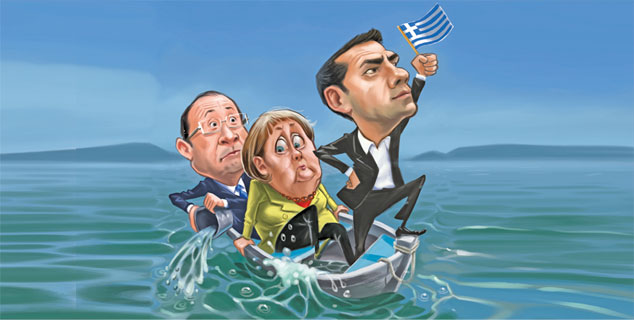
It’s been a busy week for Greece. It’s become the first developed nation ever to default on the International Monetary Fund, it’s arranging a complicated referendum for Sunday, and it’s flip-flopping over whether or not to do a deal with creditors before then. As Merryn notes, the blame for this mess ultimately lies with the hubris of the European project’s architects, but there’s little to do about that right now. The best outcome for Greece is one that enables it to return to growth and some sort of future.
That could happen outside the eurozone, or it could happen within the eurozone, as long as Greece’s debt is restructured sensibly. But as of now, we’re far from either of those happy endings. Here are three reasons why, for investors, Greece matters.
1. The domino effect
German Vice Chancellor Sigmar Gabriel argued on Wednesday that Europe had to “stick to the rules” and face down the Syriza government’s bargaining efforts, to avoid helping populist parties elsewhere in Europe. “If you allow via blackmail one party to put forward national interests above the will of all others – the likes of [Marine] Le Pen… win.” He’s right to be worried.
Le Pen, head of France’s National Front, has at least a chance of being France’s next president, and has actively argued for a ‘Frexit’ and the demise of the euro. But Gabriel’s solution – kicking the most junior member of the eurozone when it’s down – is hardly likely to put off anti-euro protest voters in other nations.
The demise of the eurozone would not necessarily be a bad thing in the long run. Perhaps one day we will see Winston Churchill’s “United States of Europe”, but such a project needs to be driven from the ground up by the people, not foisted on them by ambitious politicians looking to their legacies. But in the short to medium term, it would be a catastrophe for markets. Look at the chaos Greece has caused. Now imagine France leaving, or Italy, whose bond market is among the largest in the world. That could make 2008 look like a minor crisis.
2. Trust and eurozone banks
The Greek crisis may bring something home to other European citizens – how much sense does it make to hold money in a eurozone bank? Think about it. As a British saver, as long as you hold less in your bank account than the £85,000 guaranteed by the Financial Services Compensation Scheme, you can feel pretty safe. Even if there’s a crisis, you would expect the authorities to be on your side – the Bank of England, however independent it is on paper, won’t pull the plug on a bank and plunge you into penury if the government tells it not to.
That’s not the case in Europe. The European Central Bank has the power of life or death over the Greek banking system, but it’s not answerable to the Greek government. Indeed, it has quietly used its Sword of Damocles as leverage on the behalf of Greece’s creditors.
That might not rattle German savers, but as a Portuguese or Italian saver, I’d be looking at a “plan B” for my savings, lest they ever be at the mercy of an unsympathetic central bank. That can only be bad news for faith in the European banking system. As the FT’s Lex column notes, the crisis shows “how hard it is to run a banking union and a currency union without a fiscal union. Where the authorities responsible for the first two parts are not the same as the authorities responsible for the third, conflict is always possible. And the institutions at the centre of the conflict will be the banks.”
3. The geopolitics
It’s worth remembering that all of this is going on at a time when Russia is extremely concerned about its “sphere of influence”. That’s at least one reason why US President Barack Obama and his colleagues have been on the phone from America, urging a deal to keep Greece in the eurozone. As Marcus Ashworth put it at our Roundtable, “we can’t isolate Greece into its own little bucket. That’s the problem with Europe – they constantly think it’s their own little problem, and that no one else can deal with it. But we know what the US thinks, and we know what Russia’s trying to do.”
Why might Greece matter to Russia? Because, as Robert Kaplan writes in The Wall Street Journal, “Greece is the only part of the Balkans accessible on several seaboards to the Mediterranean, and thus is a crucial gateway to and from the West”.
Of course, Russia hasn’t given Greece any funding yet, despite overtures from Greek prime minister Alexis Tsipras. But why would Russia give Greece the money it needs now? That would allow it to remain in the eurozone, and be entirely self-defeating. Better to wait and swoop in as the saviour of an abandoned people. “The influence of Moscow can grow quickly in a devastated country as Greece will be after a Grexit,” as one fund manager tells Forbes.
What this means for your money
Whatever happens with the referendum, this could still take some time to pan out. So as far as your investments go, our position hasn’t changed from last week. Stick with your allocation to stocks (including European ones), but make sure to have more cash available than you normally would (as dry powder to take advantage of falling markets), and also have some gold in your portfolio (as insurance against financial upheaval).